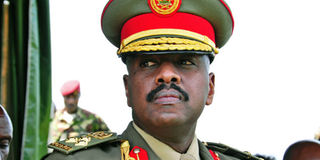Succession politics: Opposition only lesser devils, not angels

In this file photo taken on May 25, 2016 The son of Uganda's President Yoweri Museveni, Major General Muhoozi Kainerugaba attends a ceremony in which he was promoted from Brigadier to Major General at the country's military headquarters in Kampala on May 25, 2016. PHOTO/AFP
What you need to know:
- Since 2013, there has been speculation, and recently more evident signs, regarding Gen Muhoozi Kainerugaba’s aspirations to succeed his father, Gen Yoweri Museveni, as president of Uganda.
This trend of close relatives, often children, succeeding their family members in Uganda’s elective political offices has become all too common. Once criticised by the opposition, it has severally found itself embraced by those very critics.
Instances abound: when Susan Namaganda, then Bukomansimbi District Woman MP, passed away, Democratic Party (DP) swiftly anointed her sister, Veronicah Nanyondo, to succeed her, emerging victorious in the subsequent by-election through sympathy votes.
Similarly, in the wake of Robina Ssentongo’s death during the 2020-21 electoral season, DP nominated her 24-year-old daughter, Ms Fortunate Rose Nantongo, to replace her in the race for the Kyotera Woman MP seat—and she won.
While the ruling National Resistance Movement (NRM) has been the most notorious for the practice, the recent endorsement of Ms Rosemary Alwoc Ogwal by the Forum for Democratic Change (FDC) to succeed her late mother, Cecilia Ogwal, as Dokolo Woman MP underscores the multi-party allure of succession politics.
Since 2013, there has been speculation, and recently more evident signs, regarding Gen Muhoozi Kainerugaba’s aspirations to succeed his father, Gen Yoweri Museveni, as president of Uganda.
According to the opposition, and many Ugandans, this kind of transition would lay down a monarchy-like system of politics with the Museveni family ruling the country for what already seems like too long.
However, the same critics of the “Muhoozi Project” are progressively finding less fault with a member of Parliament being succeeded by his or her close relative on a bereavement ticket.
It may seem like a way of condoling with the bereaved, but this mode of succession, even when it goes through voting, undermines the principles of meritocracy and democratic representation.
Political office should not be a family heirloom. Politicians of Cecilia Ogwal’s stature have inspired other people in their constituencies to emulate them. Succeeding them solely on the basis of lineage is an insult to other aspiring leaders who lack familial pedigree but possibly possess better qualities to serve effectively.
This emergence of a de facto political aristocracy further portends an increasingly stratified society, where political power becomes concentrated within select families, with offspring inheriting not only wealth but also entrenched political influence and networks.
The opposition’s vociferous denouncement of Gen Muhoozi’s presidential aspirations as tantamount to endorsing a quasi-monarchy loses meaning in their complicity in perpetuating succession politics within their own ranks.
By implicitly supporting succession of members of Parliament by their children and close relatives, Ugandans may inadvertently sanction future dynastic successions, implying that Muhoozi’s succession of his father should never shock anyone, provided constitutional obstacles are navigated.
Mr Zeddekia Ssekyonda, Student at Uganda Christian University and Novelist




